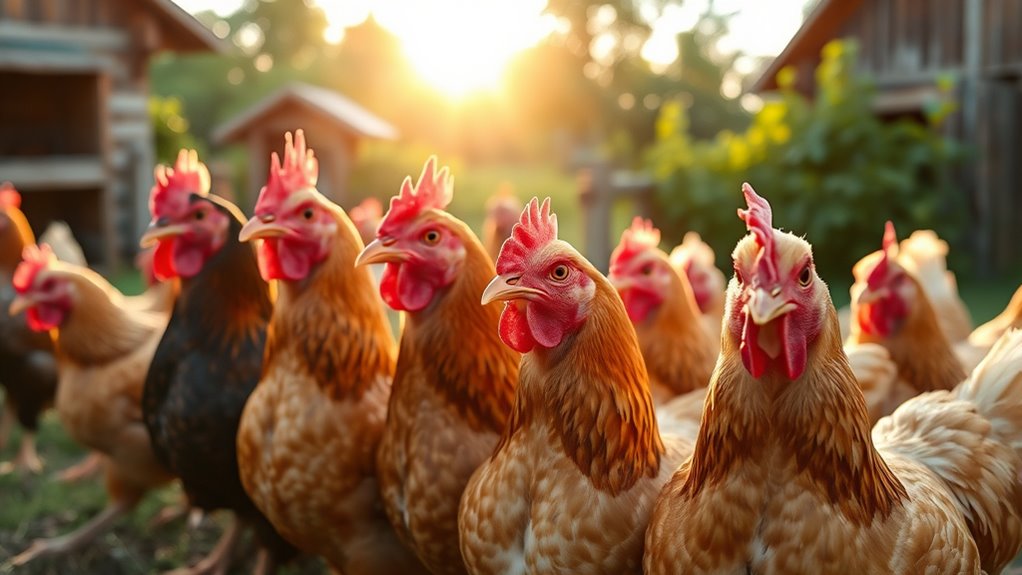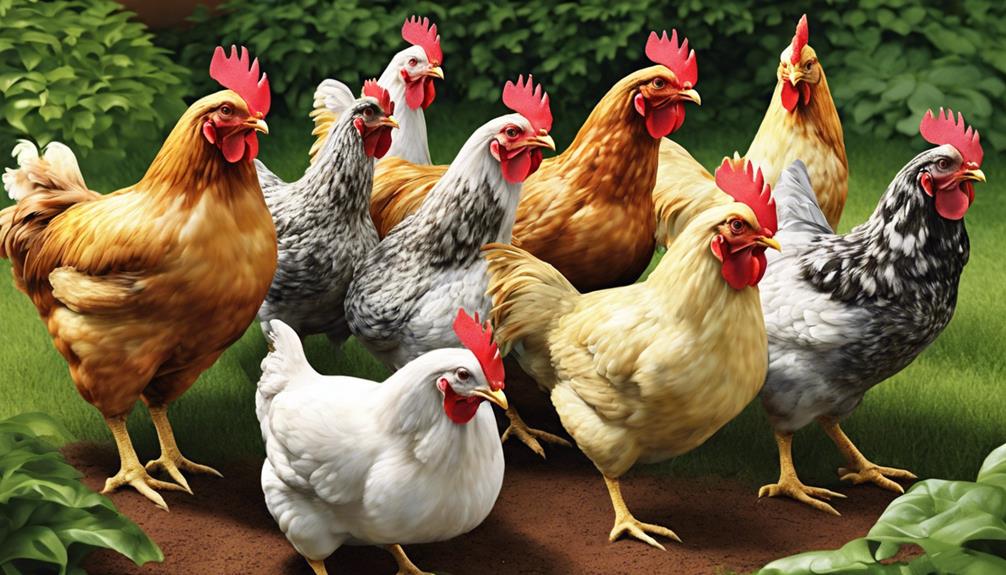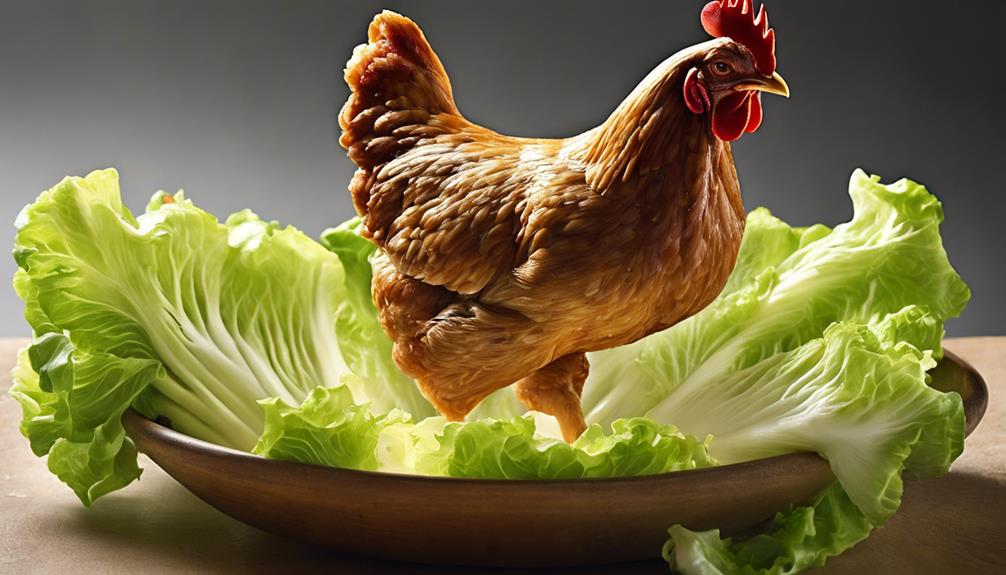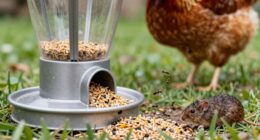Many farmers who play calming music for their hens claim it leads to tastier eggs. The gentle sounds help reduce the chickens’ stress, which positively affects egg quality by improving flavor, texture, and shell strength. When hens feel more relaxed, they produce healthier eggs with richer flavors. If you want to discover how sound can improve your eggs and overall farm well-being, there’s more valuable information to explore.
Key Takeaways
- Playing calming music reduces hen stress, leading to improved egg flavor and texture.
- Music therapy creates a relaxing environment that positively influences egg quality.
- Hens exposed to gentle melodies produce eggs with stronger shells and richer taste.
- Consistent use of soothing sounds enhances hens’ well-being, boosting egg tastiness.
- Farmers report that eggs from music-treated hens are more flavorful and appealing to consumers.

Researchers have discovered that playing music for chickens can influence the quality of their eggs, making them tastier. This finding highlights an intriguing connection between music therapy and egg flavor enhancement. As a farmer, you might be surprised to learn that the kind of sounds your chickens are exposed to could directly impact the flavor profile of their eggs. When you introduce music into their environment, you’re not just creating a more pleasant space—you’re actively engaging in a form of music therapy that boosts egg quality. The idea is simple: certain melodies or calming tunes can reduce stress in hens, which in turn can lead to higher-quality eggs with improved taste.
You might wonder how sound waves can make such a difference. The science suggests that noise pollution and stressful environments can negatively affect poultry, leading to duller eggs with less flavor. Conversely, music therapy offers a soothing background that helps chickens relax, thereby positively influencing their physiology. When hens are less stressed, their bodies produce eggs with better texture and richer flavor. Farmers who have adopted this approach report noticeable improvements, not only in taste but also in shell strength and overall egg quality. Additionally, understanding the stress response in poultry shows how calming environments can directly impact egg production and quality. This isn’t just about adding background noise; it’s about selecting the right type of music that promotes calmness and well-being.
By integrating music therapy into your poultry management, you’re effectively enhancing your eggs’ flavor profile. You don’t need expensive equipment—simple speakers playing soft classical music or gentle melodies can make a significant difference. The key is consistency; regular exposure to calming sounds can establish a more relaxed environment for your flock. This, in turn, encourages healthier laying patterns and elevates the sensory qualities of your eggs. The concept isn’t just theoretical; it’s backed by recent experiments where hens exposed to specific musical stimuli laid eggs with noticeably better flavor.
As a conscious farmer focused on quality, you can see how this approach aligns with sustainable and humane practices. Music therapy offers a natural, non-invasive way to improve your product without resorting to additives or artificial enhancements. It’s a win-win: your chickens are happier, and your customers enjoy eggs with superior taste. Incorporating music into your farm isn’t just a novel idea—it’s a practical strategy for egg flavor enhancement that can set your products apart in the marketplace. So, next time you think about improving egg quality, consider the power of music and the benefits it can bring to your hens and your business.
Frequently Asked Questions
Do Different Music Genres Affect Egg Flavor Differently?
You wonder if different music genres impact egg flavor. Research suggests music therapy can influence poultry well-being, which may affect egg taste. By adjusting the poultry diet and exposing chickens to calming music, you might notice subtle flavor differences. Some farmers believe soothing genres improve egg quality, while energetic ones might not. Experimenting with various music styles and maintaining a balanced poultry diet could help you enhance egg flavor naturally.
How Long Does It Take to Notice a Change in Egg Taste?
You might notice changes in egg taste within a few weeks. Studies show that egg quality and chicken behavior can influence flavor, with some farmers observing noticeable differences as early as two to three weeks into music exposure. Consistent environmental factors, like music genre, help chickens adapt, making their eggs taste better. Keep in mind, patience is key, and regular observation will help you identify when your eggs start tasting differently.
Are There Specific Music Frequencies That Work Best?
You might wonder if specific music frequencies work best for your chickens. In music therapy, certain sound vibrations promote calmness and health, which could influence egg quality. Experimenting with different sound vibrations—like classical or frequency-specific tones—may help you find what stimulates your hens best. Keep track of their responses, and over time, you’ll discover which frequencies boost their well-being and possibly improve egg taste.
Does Music Exposure Impact Chicken Health or Behavior?
You might wonder if music exposure affects chicken health or behavior. It can help reduce stress, which leads to a better immune response, making chickens healthier. Gentle music or specific frequencies may calm them, decreasing anxiety and aggressive behaviors. By creating a soothing environment, you support their well-being and overall productivity. So, incorporating music could be a simple way to promote healthier, happier chickens while boosting their immune defenses.
Can This Method Be Applied to Other Poultry or Animals?
You might think applying music therapy to other animals is a groundbreaking idea, but it’s not a one-size-fits-all solution. While some studies suggest music can improve egg quality and reduce stress, it’s essential to contemplate each species’ unique needs. You can explore this method for other poultry or animals, but you’ll need tailored research to guarantee it truly benefits their health and productivity, not just create a musical miracle.
Conclusion
So, now you see, embracing musical therapy for chickens might just be the secret to better eggs. Farmers believe that if you tune into the right melody, you can turn the tide in your favor. It’s clear that sometimes, you have to think outside the box to get the best results. Don’t judge a book by its cover—give it a try, and you might find that harmony in music truly makes a difference in quality.










